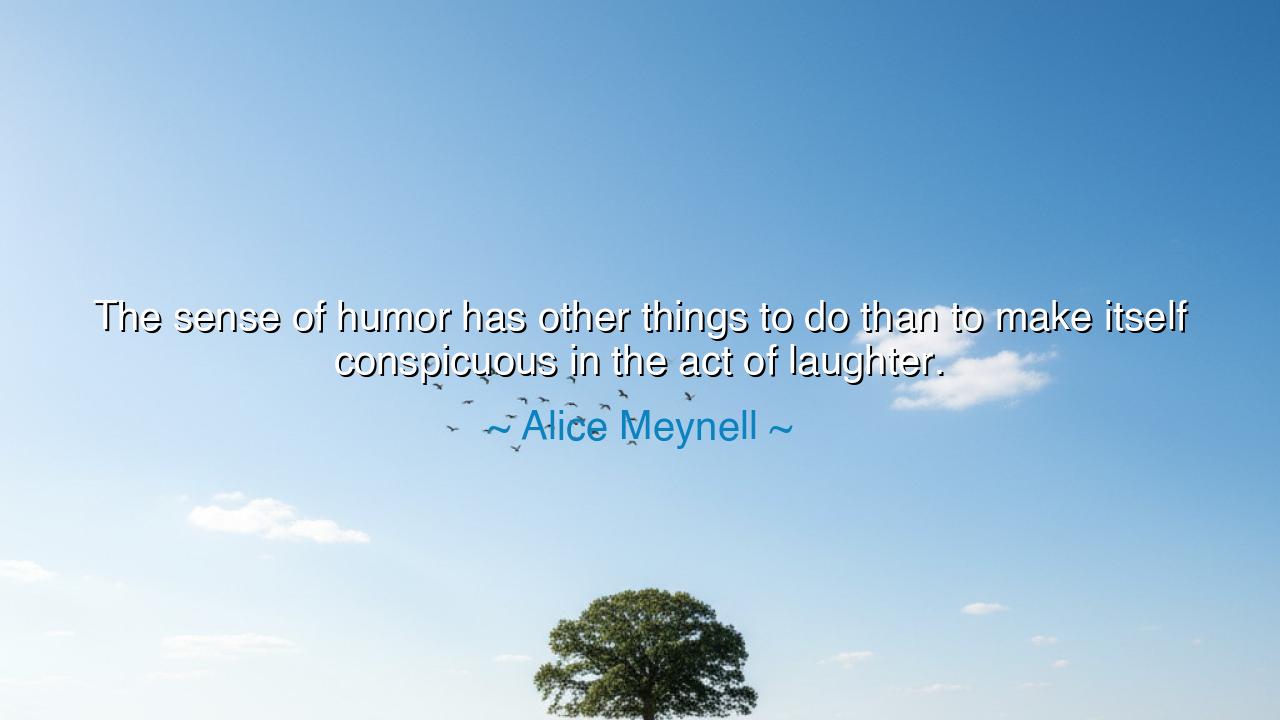
The sense of humor has other things to do than to make itself
The sense of humor has other things to do than to make itself conspicuous in the act of laughter.






The words of Alice Meynell—“The sense of humor has other things to do than to make itself conspicuous in the act of laughter”—speak with the quiet majesty of timeless wisdom. In this reflection lies a profound truth: that humor is not merely a burst of sound, nor a public display of amusement, but a way of seeing, a hidden grace that perceives life’s contradictions and bears them with lightness. The sense of humor, she teaches, is not the loud echo of mirth, but the subtle spirit that steadies the soul in the face of sorrow. Laughter is only its shadow; the true light burns deeper.
Meynell, a poet of the nineteenth century, was a woman of delicate perception—her words flowed with the patience of one who understood both beauty and pain. Her insight into the inner nature of humor reveals that it is not merely a form of entertainment, but a moral strength, a spiritual poise. To her, humor was the quiet courage that tempers despair, the wisdom that smiles gently at life’s folly rather than mocks it. She saw that laughter, though bright, can be shallow; but humor, when deep, is the soul’s resistance to bitterness. It endures silently, often unseen, yet it redeems every hardship it touches.
In the ancient world, the Stoic philosophers understood this same truth. Epictetus, born a slave, often said that “we are disturbed not by what happens, but by what we think about what happens.” In that saying lies the seed of Meynell’s idea. The man of true humor does not cry out in laughter; he simply perceives the irony of existence, and thus remains unbroken by it. The sense of humor, in this deeper meaning, is a wisdom of the heart—a way of standing upright amidst the storms of absurdity. It is the art of smiling without denial, the strength to see folly and not be destroyed by it.
Consider the example of Abraham Lincoln, who carried the weight of a nation torn in two. His heart was often heavy with grief, yet those who served beside him remembered his quiet humor. It was not the laughter of mockery, but the kind that restores balance to the weary spirit. When accused of being too light-hearted during war, he replied, “If I did not laugh, I should die.” His sense of humor was not a distraction—it was a shield, a companion that kept despair at bay. Like Meynell, he knew that humor’s true purpose is not to make itself conspicuous, but to give strength to the human soul in silence.
The meaning of Meynell’s words, then, stretches far beyond the act of laughter. She speaks of humor as compassion, as the inward turning of understanding. The one who possesses this gift does not laugh at others, but with them; does not delight in the foolishness of the world, but finds within it a spark of shared humanity. True humor is not the noise of jesters but the calm smile of sages—it does not parade itself, for it belongs to those who have looked deeply into life and forgiven it.
In every age, men have mistaken the sound of laughter for the presence of joy. Yet Meynell, in her wisdom, reminds us that joy often walks in silence. The sense of humor she describes is humble and invisible. It whispers rather than shouts; it endures rather than performs. It is present in the mother who smiles through hardship, in the teacher who forgives a child’s folly, in the soldier who jokes with his companions on the eve of battle. It is the divine irony that gives dignity to human struggle, the quiet laughter of the heart that refuses to surrender.
Let this be the lesson we carry: cultivate humor not for display, but for endurance. Do not seek to appear witty or to provoke laughter merely for applause. Instead, let your humor be an inner lamp, burning steadily when the night grows long. When you are wronged, let irony soothe your anger; when you are burdened, let gentle amusement lighten your step. Speak not always in laughter, but live with the spirit of it—a spirit that understands, forgives, and endures.
For in the end, as Alice Meynell teaches, the sense of humor is not a show for others but a strength for oneself. It is the unseen art of living well—the laughter that never needs to be heard, because it already shines from within. Those who possess it walk through the world like ancient philosophers: serene amidst chaos, tender amidst folly, smiling softly at the mystery of it all.






AAdministratorAdministrator
Welcome, honored guests. Please leave a comment, we will respond soon